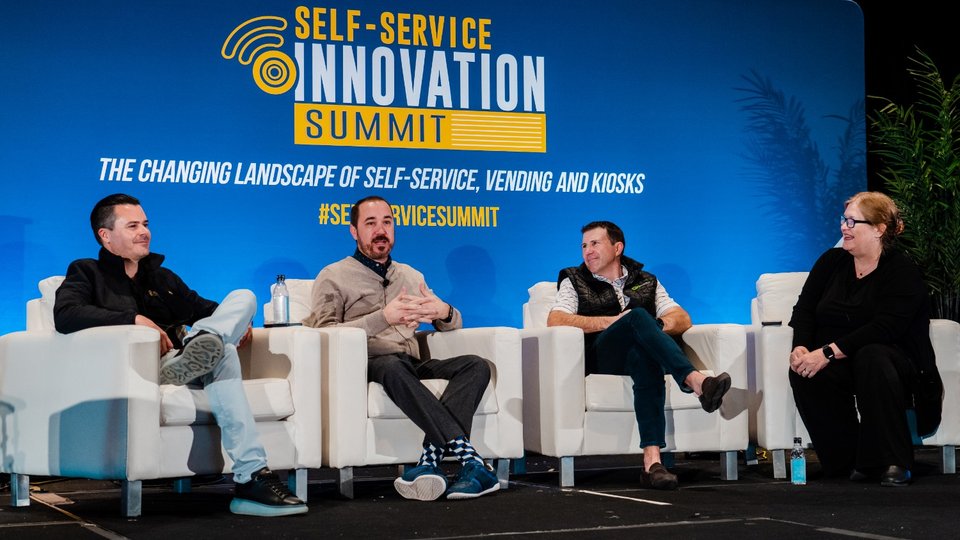Retail
Pandemic emboldens brands' omnichannel strategies
A panel at the Self-Service Innovation Summit representing different retail sectors explain what omnichannel means to their business and what impact the pandemic has made.

February 2, 2022 by Elliot Maras — Editor, Kiosk Marketplace & Vending Times
As e-commerce has expanded rapidly during the coronavirus pandemic, retailers and brands have been forced to upgrade their omnichannel sales capabilities.
A panel during last month's Self-Service Innovation Summit in Hollywood, Florida, titled, "Omnichannel integration: Do you have a game plan?" offered insight into how three different retail sectors are addressing this challenge: restaurants, movie theaters and automotive dealerships.
Omnichannel has taken on new life during the pandemic, said panel moderator Mary Jesse, CEO, MTI, which makes hardware and software for kiosks. Noting the panelists represented different retail sectors, she asked each to explain what omnichannel means to their business.
Fast casual to embrace vending
Panelist Alex Eagle, CEO, Freebirds World Burrito, a fast casual restaurant chain, said his company's omnichannel continues to evolve along with new shopping trends. Beyond e-commerce and delivery sales, more recent trends include extending the restaurant's product into retail environments and non-traditional environments such as vending.
"The 'omni' part for me is the brand has to remain the same and the product has to remain the same," he said. For example, if he moves his chips from the restaurant into packaged chips for a retail environment, the chips must taste the same.
"Or if we move our bowls from our restaurant into a vending environment, that bowl has to replicate the experience that you would have where we started, in our four walls environment," he said.
Eagle said he is particularly interested in vending as a growth channel.
"Vending to me has a better ROI potential than licensing our brand into non-traditional (locations)," he said.
Prior to the pandemic, Eagle said his company integrated delivery with the company website. The company also enabled third-party delivery from its POS system.
"When the pandemic hit, we were incredibly grateful that we were relatively early adopters," Eagle said. Pre-pandemic, the restaurant industry was resisting the third-party delivery companies because the model is economically and environmentally inefficient, but more importantly, the third-party delivery companies keep the restaurant data.
He said his company has made "massive" investments in technology to improve simplification to deliver a better guest experience and to help employees and has eliminated positions that are less pleasant.
Movie theater chain responds
Panelist Hank Green, vice president of food and beverage, AMC Theatres, a movie theater chain, said his company's omnichannel challenge is creating an experience for guests that is not only consistent across its different brands, but seamless.
"We want that ticket purchase (and) food purchase to be a seamless experience for them (guests)…and give them the choice of how they want to have that experience," Green said. "Do they want to buy their tickets online, do they want to buy them through the app, do they want to still buy them at the theater, either from a kiosk or from a person?"
The pandemic changed the company's business focus, he said.
Prior to the pandemic, AMC was trying to decide what experience a theater could give that was better than the home viewing experience. Most of the innovation at the time focused on box office sales, such as offering tickets online and with an app.
When the theaters closed during the pandemic, the company worked to improve the user experience. The pandemic gave the company some time to consider how to get more food and beverage sales once people were in the theater.
"It was a very big effort to transfer that guest experience from ticketing to the food and beverage space which is far more complicated," Green said.
Automotive dealerships respond
Meanwhile, when the pandemic hit, automotive consumers were struggling with whether or not they should touch a kiosk, said panelist Todd Marcelle, CEO, GoMoto, which provides digital solutions for automotive dealerships. All GoMoto kiosks had antimicrobial screens as well as gloves and sanitizer and instructed dealerships how to present it as a safe option.
"We had to do a great job of educating consumers and dealers why this is a safe option and creating and adapting our technology how to do so," he said.
Automotive traditionally lacked the innovation to bring the retail experience to the consumer because it always felt it had to control the customer experience, he said.
In creating GoMoto, Marcelle said he looked at Chick-fil-A, which has servers with tablets at the drive in area, drive-thrus, mobile ordering and indoor dining.
"They (Chick-fil-A) must make it so easy based on what you want to do based on how much time you want to spend," Marcelle said. "I really look at them as an innovative way to service a lot of customers in a frictionless way, that even when it's busy there, it still doesn't feel like it takes you a long time."
As part of its omnichannel initiative, GoMoto also developed mobile check-in. The consumer receives a QR code which they scan at the kiosk, whittling the transaction time from two minutes to 10 seconds.
"For us as consumers it lowers transaction prices and creates a better experience," he said.
On the service side, omnichannel addresses meeting the customer where they want to be met.
"Some customers never want to come into the dealership, so we need to offer a valet service…we need to invest in mobile trucks…we're helping dealers enable mobile service where they'll actually take the service truck to your house and do the oil change," he said.
One challenge automotive dealers face is to educate employees using new technology on why it does not threaten their jobs, Marcelle said. In stores that are using the technology successfully, the service advisers use it as an extension of themselves.
The pandemic's impact
Asked how customers have changed since the pandemic, Eagle at Freebirds World Burrito said there has been higher check averages in the digital channels, which has been a big benefit since the digital channels are more profitable.
Asked if he thinks they have retained the pandemic lift, Eagle said "yes." The pandemic encouraged many people to try online ordering or food delivery for the first time.
"It drives new occasions that you didn't have before," he said.
Guest expectations at movie theaters made the business more complex, so AMC Theatres sought to simplify operations where possible, Green at AMC Theatres said. Guests wanted to move through lines faster or evade lines completely, which complicates employee responsibilities. The reduction in employees also complicated employee roles.
"Simplifying the operation to try to meet the new guest expectations has really been the focus for our groups since the pandemic started," Green said. This required reducing food and beverage SKUs, some of which occurred due to supply chain issues.
"Trying to create an experience for our crew that is executable that meets the guest expectations that are heightened from where they were before," was how he described the challenge.
"The goal is to do fewer things better," he said.
The pandemic also accelerated adoption of mobile food and beverage ordering, which AMC Theatres introduced in 2015.
"The pandemic gave it the ability to accelerate. Now it's at every theater," Green said.
A lot of guests that have returned to the theaters since the pandemic shutdown are buying more of the larger portion food items since the company is now offering more choices.
In addition, regular visitors more often use mobile ordering.
Marcelle at GoMoto said the pandemic has accelerated self check-in and check-out.
"COVID accelerated all the self-led options, (including) on the financing side, where you can go on almost every car dealer's website, or a used car outlet, and literally do the transaction online and they'll drop the car off at your house," he said.
A global movement
Omnichannel retail is a global movement, with oversea markets catching up to and surpassing the U.S.
Marcelle said the U.S. has been the leader in investing in new technology. However, in the last two years, all geographic regions have adopted similar technologies.
India has surpassed the U.S. and China on introducing phone based micro transactions, Marcelle said, utilizing Apple Pay. When a consumer goes to a fast food restaurant or a fuel station, they can order in their vehicle.
"It knows you're at pump 4. You just select 87, or 79 or 92, and then you literally fill up and you're gone," he said. "That is how fast I'm seeing innovation get into what I call frictionless commerce."
"You will see that take off stronger in countries where there's no legacy," Jesse agreed.
About Elliot Maras
Elliot Maras is the editor of Kiosk Marketplace and Vending Times. He brings three decades covering unattended retail and commercial foodservice.










